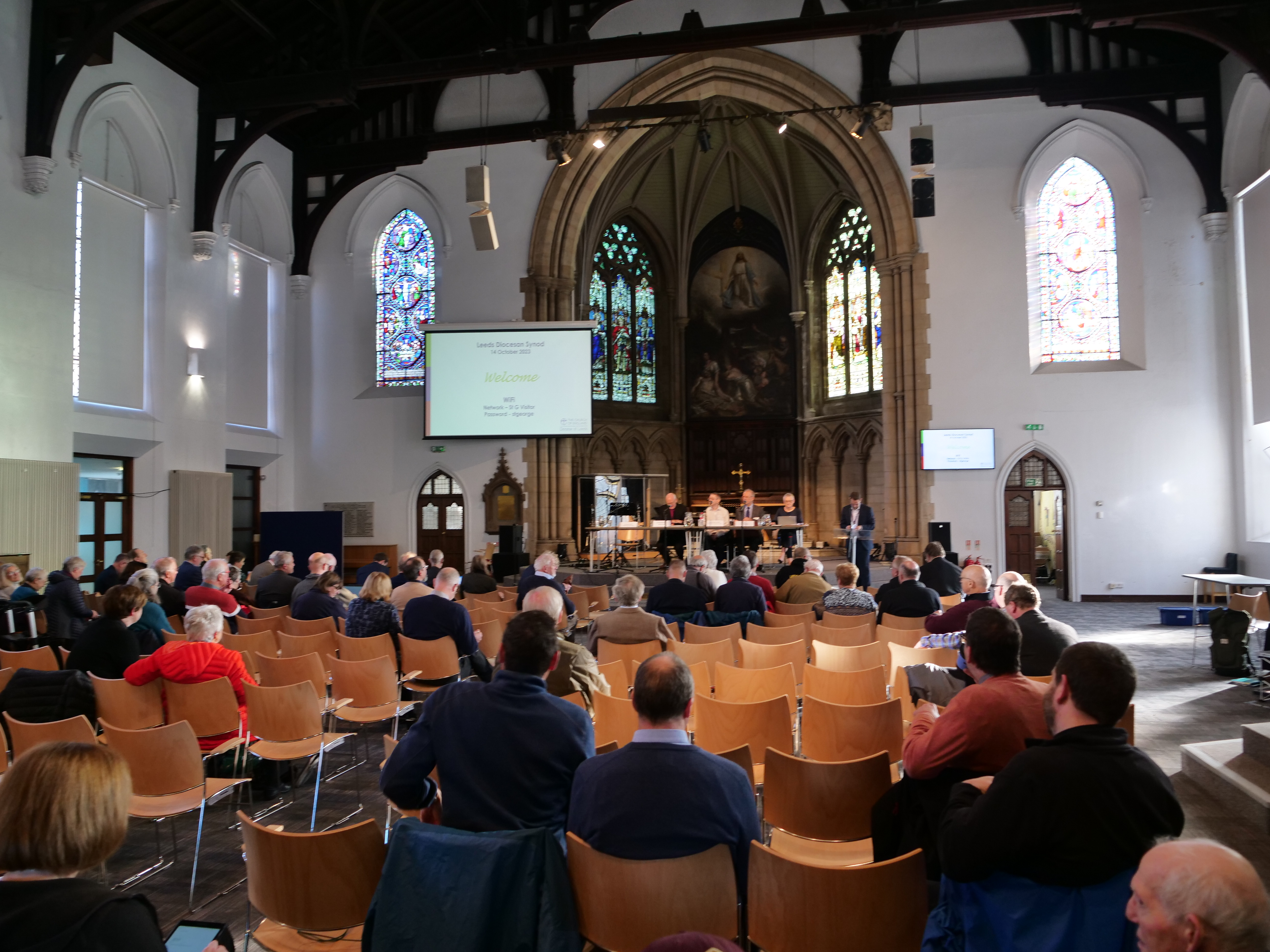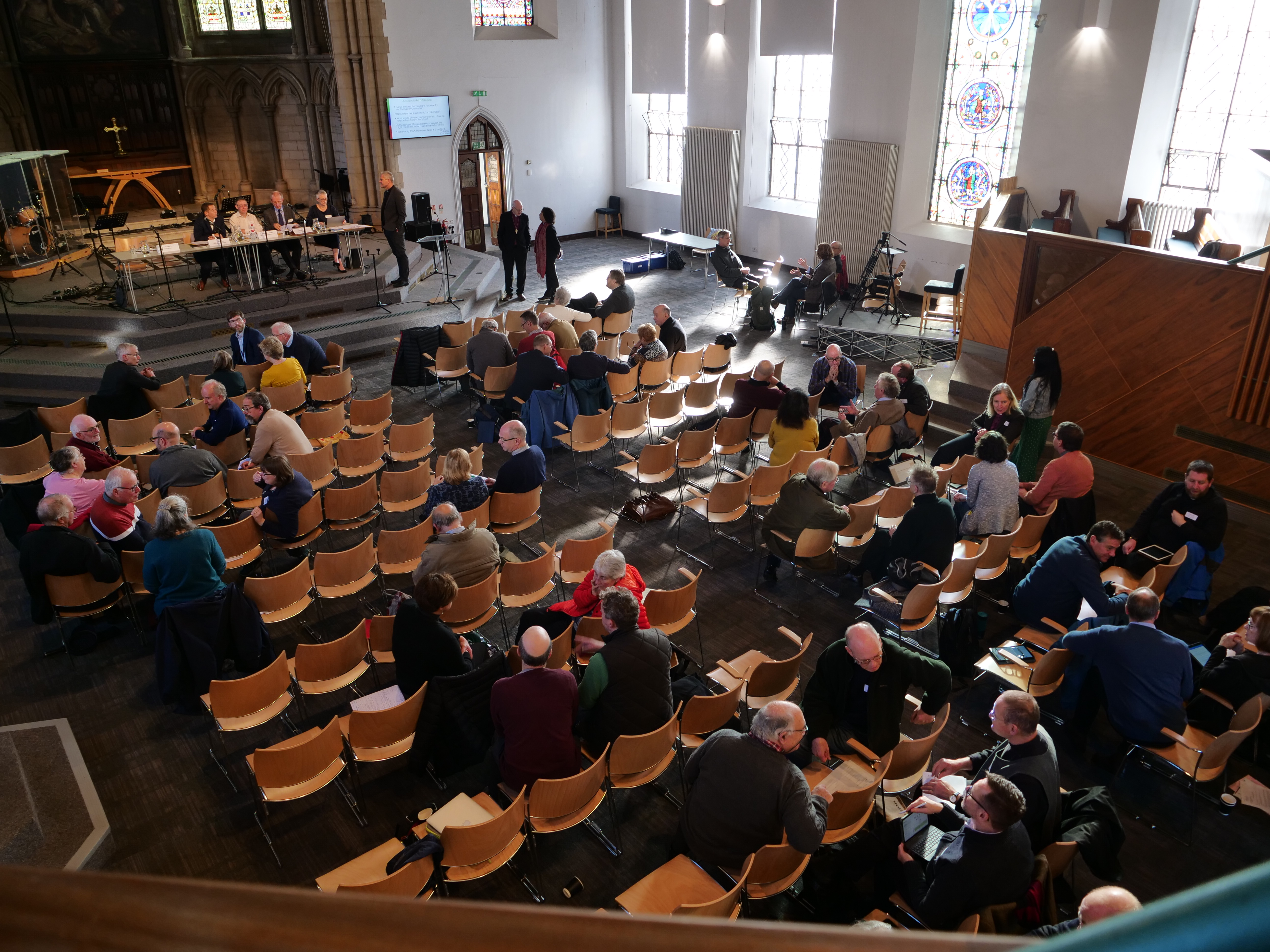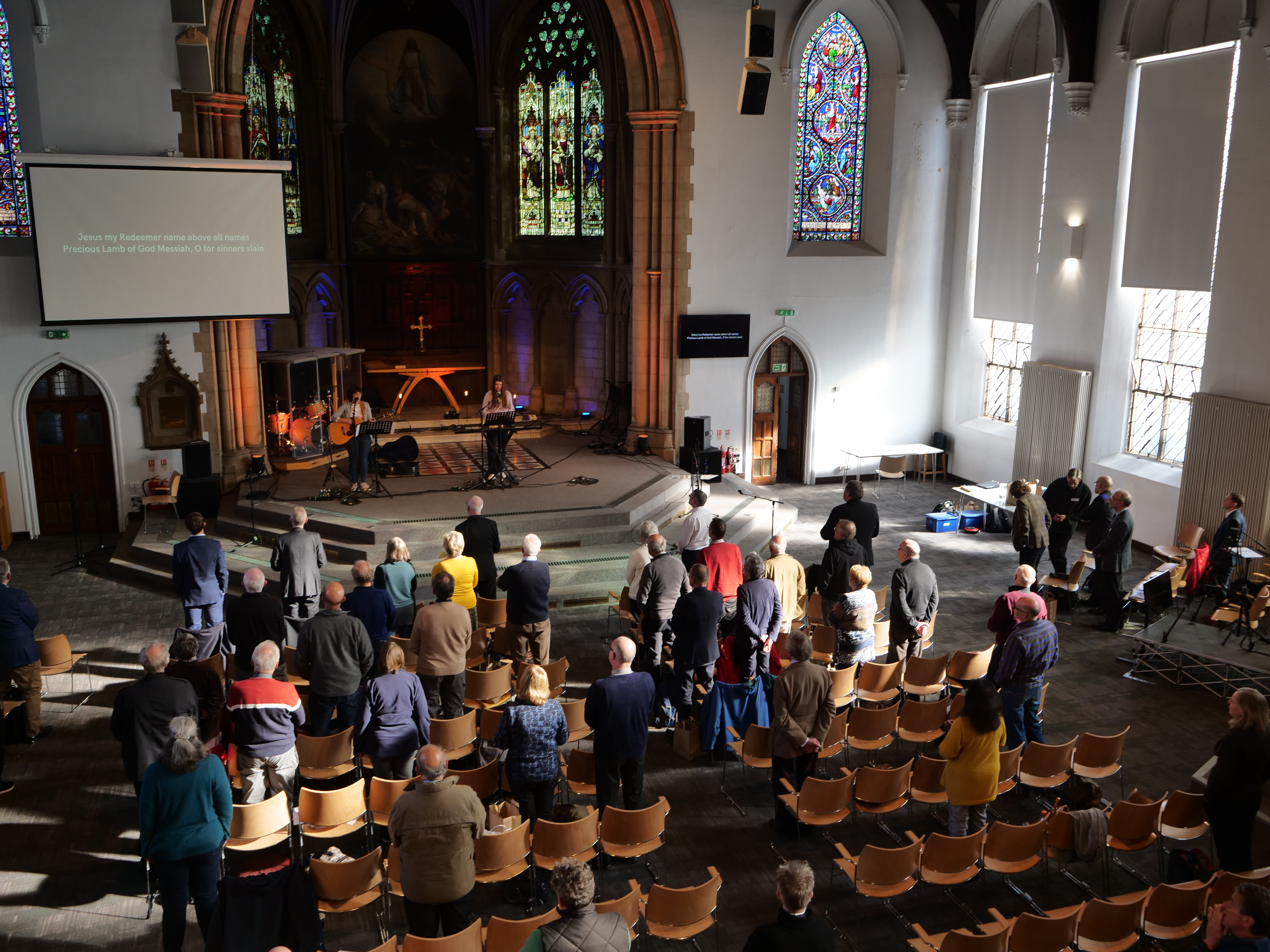 Our diocesan overseas links, our 2024 budget, our Barnabas work and more were all discussed at the most recent meeting of Diocesan Synod.
Our diocesan overseas links, our 2024 budget, our Barnabas work and more were all discussed at the most recent meeting of Diocesan Synod.
Taking place on Saturday, October 14 at St George’s Leeds, Synod was welcomed to our in-person meeting by the Bishop of Leeds, the Rt Revd Nick Baines.
The meeting began with an amendment to one of the Church of England’s canons being shared, strengthening our Safeguarding Team’s abilities, before the minutes of the previous Synod were approved.
Bishop Nick then gave his presidential address, speaking of our need to navigate the 'uncertain now' with confidence and faith, looking to build a church that serves the world today with grace and that shows how people who disagree can walk with one another.
Synod then heard from the Very Revd Andy Bowerman, Dean of Bradford, about a recent review of our overseas links.
 A presentation and discussion helped share the importance of our links, looking to make sure that they are relational and well-structured so we can learn from one another in the most effective ways.
A presentation and discussion helped share the importance of our links, looking to make sure that they are relational and well-structured so we can learn from one another in the most effective ways.
After a break, Synod heard from Canon Irving Warnett, Chair of the Diocesan Finance, Assets and Investments Committee, and Geoff Park, Chief Finance Officer for the diocese, about our 2024 budget.
After discussion, Synod voted to approve the budget, looking to face the challenges of today with realism and hope.
After lunch Bishop Nick gave a short update on the recent procedural developments around Living in Love and Faith, before Diocesan Secretary Jonathan Wood and Director of Church Revitalisation the Revd Jude Smith presented an update on our Barnabas work.
 Jonathan and Jude talked about how Barnabas is the way we are delivering on our vision of Confident Christians, Growing Churches, Transforming Communities, as well as the practical support and resources already available and what is to come.
Jonathan and Jude talked about how Barnabas is the way we are delivering on our vision of Confident Christians, Growing Churches, Transforming Communities, as well as the practical support and resources already available and what is to come.
More on Barnabas can be found here.
Synod then debated motions around Deanery Synod allocations for Diocesan Synod elections, voting on how we allocate representative numbers and how we elect people to Diocesan Synod.
These motions will allow Synod elections in 2024 to go ahead smoothly.
Synod closed with worship led by the Revd Eve Ridgeway of St George’s Leeds.
Synod next meets in 2024.
Bishop Nick’s presidential address can be read below.
Twenty Sixth Diocesan Synod, Saturday 14 October 2023
Presidential Address
“When Bob Dylan wrote ‘The times, they are a-changing’ way back in 1964, he was merely stating a universal truth. Times always change. The problem and the challenge is that, in whatever era we live, we always seem to assume that ‘now’ is ultimate. But, as with the term ‘post-modernism’, we know what it is ‘post’, but we don’t know what it is ‘pre’. That’s the nature of things. Time never stands still, and today’s opportunities and challenges simply give way to – or generate – the challenges and opportunities of tomorrow and beyond.
“This has been driven home to me recently by a number of things. I wrote this address immediately after emerging from an online webinar on UK Defence with the Head of Strategy for the British Army and a chaplain who addressed some of the theological and ethical lenses through which we need to look at military policy and activity. The UK’s Integrated Review of 2021 had to be refreshed in 2023 because the world had changed again – war in Europe changed the complexion of our engagement in the so-called Indo-Pacific tilt. (Boris Johnson famously laughed off the notion that “tanks would roll across the soil of Europe” … only a couple of months before tanks actually did roll into Ukraine.)
“But, I have also been reading John Kampfner’s new book ‘In Search of Berlin’ – an overview that constantly makes you wonder why no one thought to stop what was evidently coming as the Kaiser gave way to Weimar, Weimar led into Nazism, Nazism collapsed into the GDR, and then western democracy assumed that the world had changed for the better and for ever. But, the rise of the Far Right in Germany now fuels fears of what might happen in the 2030s and 2040s, despite memories of what happened in the 1930s and ‘40s.
“Now, I know you haven’t come this morning for a history lesson. But, I cite these examples in order to stress the need for some perspective when ‘events’ happen. Now is never the ultimate; the last word has never been spoken. The end of one thing gives way to the beginning of another. We can learn from the past, but the past can never be repeated … any more than a river can pass the same point twice. What is key is simply this: how do we remain faithful to what we believe to be our core vocation when the world around us keeps revolving away from any sense of control?
“And here is the nub of the matter. Human beings like to be in control and start to fear when control is felt to have been lost, or uncertainty colours our perceptions of our own agency. But, as I noted many times during the Covid lockdowns, uncertainty is the norm in this world – it is not an aberration. And learning to navigate uncertainty with confidence and faith is key to effective leadership and living.
“By now you will have figured out why I have started this address in this way. Since we last met as a synod the world has changed. A week ago, international news was still dominated by Ukraine - Russia’s behaviour in prosecuting its war and challenges to international support of Ukraine, particularly in the United States (now paralysed by the absence of a Speaker of the House). Then Hamas, rooted in the tradition and mindset of Islamic State, committed unspeakable atrocities in Israel, and everything changed. The news focus shifted to Gaza. And we now, as the shock and horror become accommodated, await Israel’s next steps in securing its territory, defending its people and responding to the outrageous terrorism that has struck at its heart. And we know that whatever happens next won’t be the end of the chapter, let alone the end of the book, and that what happens in the next few days and weeks will change again the possibilities facing the world. However justified Israel’s response might be, we also know that the children of violence will harbour their own grievances and feed them into the next generation of violence. And so it will go on.
“Which is why words of hope cannot and must not be empty. They must be rooted in realism, but not bound by the ‘ultimate now’. As Dr Alan Garrow brilliantly opened up at the Diocesan Clergy Study Day in Wakefield Cathedral on Thursday this week, the Lord’s Prayer – at the heart of our Christian and Anglican liturgy – actually has us asking for “tomorrow’s bread today”: “Give us today the bread of the future kingdom.” We long for the fullness of peace rooted in grace and mercy, the eschatological feast of heaven, whilst committing ourselves to the world as it is now. I have phrased this theology in the past as: “Christians are not driven by fear, but drawn by hope”. This hope, whatever is happening in the world and however uncertain we feel about control of events, comes to us from the future – tomorrow’s bread – and looks like resurrection. This is the vision that draws us.
“This is why our diocese has lived for most of its nearly ten years with a simple set of values (all beginning with ‘L’ for Leeds…): Loving Living Learning. We love God, the cosmos of his creating, and our neighbour as ourself. We live in the world as it is, but are drawn by a vision of how it might be – the kingdom of God. And we are having to learn as we go … because a changing world compels us to look differently and afresh and learn from our experience and the perspectives we gain from history.
“In today’s synod we will look at matters that have as their backdrop the uncertainties of the world at the moment. But, that does not diminish the importance of the local or the immediate. Underlying much of what we discuss today is a fundamental question for which we as a synod must take active responsibility: what sort of a church do we need to be in order to serve the world we are called to live in at this point in history? And, if we have an idea of what that church ought to look like – if it is to be faithful to its particular vocation in the world – then what role do I play in helping to shape it accordingly?
“Now, that sounds fairly straightforward … until other people, other Anglican Christians, begin to put in their perspective. This week the House of Bishops came to some conclusions about ‘Living in Love and Faith’ (LLF) and the next steps. I was not present – a combination of ill-health and the very short notice of the House meeting. I also did not know that eleven bishops would issue a dissenting statement on Thursday. I will reserve my views on this behaviour, but note that not a single newspaper thought it worth reporting on. In other words, we are now talking to ourselves because no one out there is interested. This says something.
“However, as I said at the beginning, the last word has not been uttered in these matters … and never will be. Circumcision might not be a burning issue for today’s western church, but the factors that led to schism in the early church around the issue – theological and cultural – still colour our debates about sexuality today. Again, Dr Eeva John’s address to the Clergy Study Day on Thursday invited us to be honest and ‘real’ about ourselves (what we actually think about our handling of the Bible rather than our aspirations), about the real world (the varying experience of other Christians/Anglicans), the reality of others (rather than wishing they could just see things the way I do), and the real God who, as revealed in Scripture, cannot be controlled, appropriated or bent to my particular biblical preferences. I have long been haunted by John 5:39 where Jesus confronts the biblical authorities of his time with this: “You search the Scriptures because you think that in them you have eternal life; and it is they that testify on my behalf. Yet you refuse to come to me to have life.”
“Just think about that. Where do we place ourselves in that context? Standing with Jesus over against the Jewish leaders? On the sidelines looking on as entertained observers? Or with those whom Jesus is addressing? As a church leader who has been reading the Bible for sixty years, I place myself with those who need to hear Jesus’s words: you search the scriptures and miss the point completely, even though he is standing in front of you. Some humility about our readings of scripture, of the world, of ourselves and of other Christians will not go amiss.
“Let’s briefly put this in a different perspective. This morning we will look at a review of our partnership links with other dioceses around the world. Nearly ten years in to the partnerships we inherited form the historic dioceses of Bradford, Ripon & Leeds and Wakefield, it is right to review and, consequently, refresh, revive, conclude or re-envision. As we do this, what is unavoidable (I hope) is the conviction that having links around the world and the Anglican Communion is vital to our own life here. Looking through the eyes and listening through the ears of Anglicans whose life experience, cultures, norms and expectations are different confronts us – sometimes uncomfortably – with how we are seen, understood and experienced by them.
“This is why LLF – and being faithful to challenges to our vocation as the Church of England – has to be seen in the context of our unity with other Christians. And what is immediately obvious is that Christians do not agree on certain vexed matters. It is unlikely many will change their mind in order to pursue unity (which would be a fantasy if based on a utilitarian desire for peace at all costs); so, we have to do two things: first, accept the reality of disagreement; and, second, to accept that this very living with difference might be what God calls us to and has designed his church for. Maybe, just maybe, our vocation is to show the world what it can look like for people of difference to live in unity … despite, or even because of, their differences. I haven’t the time to illustrate this from the scriptures themselves, but the Bible is riddled with this stuff.
“Now, to go back to the point: if we are to be a church that makes a difference in a conflicted world – less concerned or preoccupied with our internal purity and more committed to showing the world what redemption and grace look like – then we need to take seriously who we are as Anglicans in Yorkshire and what should guide our priorities. Today we look at the budget … which is not a set of numbers to be agreed with, but is (what the Archbishop of Canterbury once described as) ‘theology in numbers”. Our budget tells us whether we think it is worth coughing up sacrificially to resource a church or diocese that believes it can and must make a difference in and to the world. That is what our parish share is about. Not funding a bureaucracy – which it doesn’t – but enabling a mission that is transformative: building confident Christians who grow churches that help transform their communities.
“That is why elections to deanery and diocesan synods matter. Conviction has to be earthed in mundane structure and attention to process and people. I hope we will note the creation of the Hunslet Gathering – a new initiative in church planting. Promulging Amending Canon 42 doesn’t sound exhilarating, but it is the structural prioritising of safeguarding in the church, but for the sake of the world around us.
“I have said enough. Thank you for your patience. Today let’s listen and speak with grace, asking God for wisdom as we navigate contested territory and seek a common mind as God’s church here in the Diocese of Leeds. Bob Dylan is still going strong; so can we as the times change and we seek to be faithful to God’s call at this time and in this part of God’s world.”
The Rt Revd Nicholas Baines
Bishop of Leeds
14 October 2023
